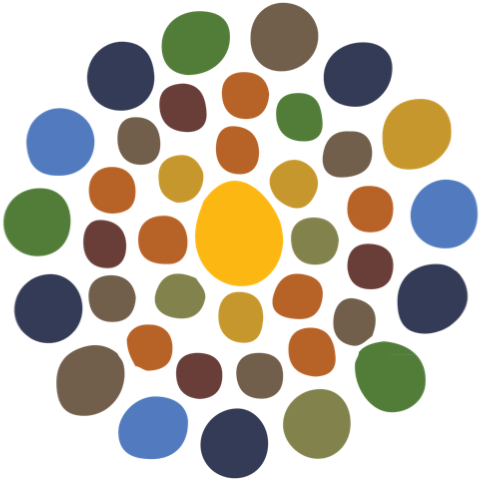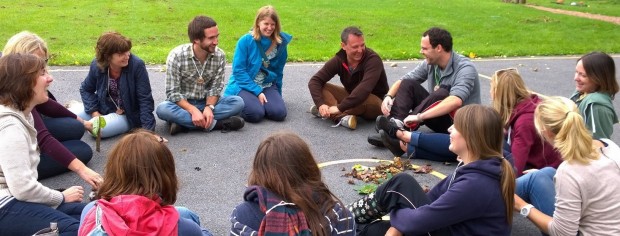Creating music can be fun and helps people feel part of something bigger than themselves.
Community. Something shared by all. When we create new music in place, with inspiration from inside ourselves, each other and the environment around us, something special and unique is happening for the very first time. Latest brain research shows that at a very fine subtle level, within the brain chemistry, everyone involved is having the same experience, a shared moment of the present, created as chemicals in their brains. At night, those chemicals are usually stored as new links and pathways. Making music together creates community. The Natural Musicians activities can be useful for any group of people that wants to become stronger and more healthy, as individuals, and as a group.
The Natural Musicians is a new set of activities and games that uses found natural objects and visible patterns to create, compose and perform music using voice, body percussion and found sounds. The Natural Musicians increases self confidence as the activities ask of a person only what they can offer, there is no right or wrong sound! Every person has value, is valid, and is validified by the music. The activities also help create fellowship, not only with each other, but also with the natural world. It is my belief that this is ultimately for the the greater good for all.
But why, and how is this useful?
“We may not be many but we are ready to be strong as one” Fat Feddy’s Drop (Popular band from NZ)
People who are part of a community have a strength beyond self, and often a greater inner strength and wellbeing. We are all interconnected. “The notion of a separate organism is clearly an abstraction, as is also its boundary. Underlying all this is unbroken wholeness even though our civilization has developed in such a way as to strongly emphasize the separation into parts”. –David Bohm and Basil J. Hile, The Undivided Universe.
Divide and conquer! Advertisers will tell us in 1000 ways that you need another thing or be like someone else to be truly happy. In his book, The Loss of Happiness in Market Democracies, Robert E. Lane argues that as prosperity in a society increases, social solidarity decreases. Happiness not only declines, people become more distrustful of each other as well as their political institutions. Lane argues that we must alter our priorities; we must increase our levels of companionship even at the risk of reducing our income. And that is where music can help increase companionship and wellbeing
Olds and Schwartz (Associate Clinical Professors of Psychiatry at Harvard Medical School) argue in The Lonely American that loneliness is often mistaken for depression. Instead of connecting with others, we consume a pill. Being lonely is outside of our individualistic world view so we don’t even see it as a problem.
Harvard’s Robert Putnam writes about social capital in his book, Bowling Alone, and shows how social ties are not only important for personal well-being, but also for our democracy. To paraphrase Putnam, “the culture in which people talk to each other over the back fence is the culture in which people vote.” Apparently, when you feel part of a group, you’re more likely to contribute to it — such as by voting. Social media is enabling people take to causes so effectively because the community is in the ether, not separated by time or place.
UC Berkeley’s George Lakoff has said that we can only bring about progressive social change by evoking empathy. You can’t get people to change by loading them up with facts or shaking your finger at them. You must talk to others with respect and caring — and then you connect. Social capital is thus central to progressive social change.
Social capital is important for the planet as well. Environmentalist and author Bill McKibben says that we won’t have sustainability without community. Until we see our selves, nature and other people (not the things they sell!), as our main source of security, we’ll keep turning to things, using up oil and other resources and heating and polluting the planet. Until we have community in our neighborhoods, we’ll keep going to the shops in the day and to the TV for our evening’s entertainment.
And so there are some of the reasons why I think that creating and music in groups, outdoors, with the interconnected source of inspiration being ourselves, each other and the world around us is beneficial for us all.

